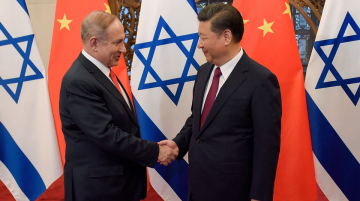
June was a relatively uneventful month for Chinese commentators and journalists covering developments in Sino-Mediterranean relations. Among the few events that garnered significant media attention was the state visit by Palestinian President Mahmoud Abbas to Beijing.
In line with the prevailing narrative, since the Saudi-Iranian diplomatic rapprochement, i.e., the event that triggered/decisively contributed to what in China is now called the “reconciliation tide” of the Middle East, Abbas’s visit was described in positive terms. However, it is clear that Chinese experts harbor limited optimism regarding a substantial improvement in the Israeli-Palestinian situation.
In an interview with the Global Times, Fudan University’s Sun Degang described the Israeli-Palestinian issue as “the long-term, core, and sensitive root issue within the Middle East.” He expressed skepticism over the likelihood of significant reconciliation materializing in the foreseeable future, especially in light of Israel’s current “extreme right-wing government.”
In this context, Sun argued that China’s own four-point proposal, introduced by President Xi Jinping in 2013, holds greater appeal to both parties compared to any initiative put forth by Washington. Thus, he contended that “China can exert its influence by managing the differences [between the Palestinians and the Israelis] and by bringing Palestine and Israel back to the negotiating table.”
Yet, speaking to a journalist of Liberation Daily, Sun acknowledged that “if China wants to facilitate the peace talks between Palestine and Israel, it may still need the United States to play some role. Whether a ‘China-U.S.-Palestine-Israel’ mechanism will be formed, and a phased agreement reached is something that has to be seen.”
Newfound Chinese Optimism in the Middle East
Despite the lingering issues between Israel and the Palestinians, Chinese commentators maintained a sense of optimism as they hailed the resumption of diplomatic relations between Qatar and the United Arab Emirates (UAE), along with the announcement of new Qatari investments in Iraq. Similarly, the UAE’S withdrawal from the US-led Combined Maritime Forces and Iran’s proposal for a joint Gulf maritime patrol was also viewed positively by Chinese experts, though they highlighted that the Iranian initiative will unlikely be implemented and tempered expectations for substantial improvements in Iran’s economic and diplomatic situation in the immediate future.
These trends are expected to persist. In an article published by Liberation Daily, Shanghai International Studies University’s Ding Long was quoted saying that “after the Russia-Ukraine conflict, the international status of Saudi Arabia and other oil-producing countries in the Middle East has risen significantly, contributing to their increased strategic autonomy and flexibility. Not only has their diplomatic room for maneuver expanded, but their diplomatic skills have also become more mature.” Nonetheless, Ding noted that since the United States has invested so much in the region since the end of the Cold War, Washington will continue to preserve its primacy there, regardless of the fact that today no country in the region shares its regional and global outlook, especially with regard to containing China.
Moreover, Washington’s focus on security, rather than development, is increasingly self-defeating. This point was also made by Yuan Wu, an associate researcher at the West Asian and Africa Affairs Department of the Chinese Academy of Social Sciences, in an article on Egypt’s recent application to join BRICS.
Democracy vs. Authoritarianism
Against this background, Liu Zhongmin published an interesting commentary in The Paper, discussing the consolidation of authoritarian institutions in the Middle East. Liu sees the contradiction between democracy and authoritarianism as one of the main sources of tension in the region. As he explains, this is an increasingly important topic as the Arab Spring has not produced a democratization wave in the region and, at the same time, both Turkey and Israel are displaying characteristics reminiscent of authoritarian regimes.
Liu contends that throughout Middle Eastern history, authoritarian institutions have played a positive role by limiting the excesses or correcting the mistakes, made by multi-party democracies. As an example, he points to instances of military interventions in Turkish politics.
However, Liu also acknowledges that “the negative effects of the authoritarian system cannot be ignored. Gerontocracy, military dictatorships, lack of popular support, arbitrary amendment of laws, and excessive centralization, are all problems of Middle Eastern authoritarian countries. Once a country’s political system becomes too rigid and fails to reform, its centralization and strongman politics will undermine development.
Changes and reconstruction will eventually happen through reform or revolution. In the context of profound changes unseen in a century and great transformation in the Middle East, a certain degree of authoritarianism may help the countries of the region realize their major goals of domestic development and external peace. Yet, they also must not reject the global trends of democratization.”
Serbia’s Challenge in the Balkans
We close this issue of the ChinaMed Observer with a rare article on another part of the wider Mediterranean region: the Balkans. The Global Times interviewed Sun Keqin, a researcher at the China Institute of Contemporary International Relations, who contends that the problem is that the Albanian Kosovo authorities are not satisfied with the status quo and refuse to recognize the rights and interests of the Serbs in northern Kosovo, as defined in the 2013 Brussels Agreement.
Sun argues that they want to take advantage of the Russia-Ukraine conflict and achieve total domination of Kosovo with the acquiescence or support of the West. According to him, the history of Kosovo demonstrates Western countries’ determination to eliminate Russian influence from the region. Western intervention, then, has also affected the Serbian economic situation. Serb nationalism, Sun points out, is another obstacle to the issue’s peaceful resolution, though it helps to strengthen the authority of the Serb government vis-à-vis Western pressure. Sun concludes by stating that in the long run, Serbia must find a way to alter these dynamics with the West.
For more information about the ChinaMed Project and to view the original editions of the ChinaMed Observer, please click here.







